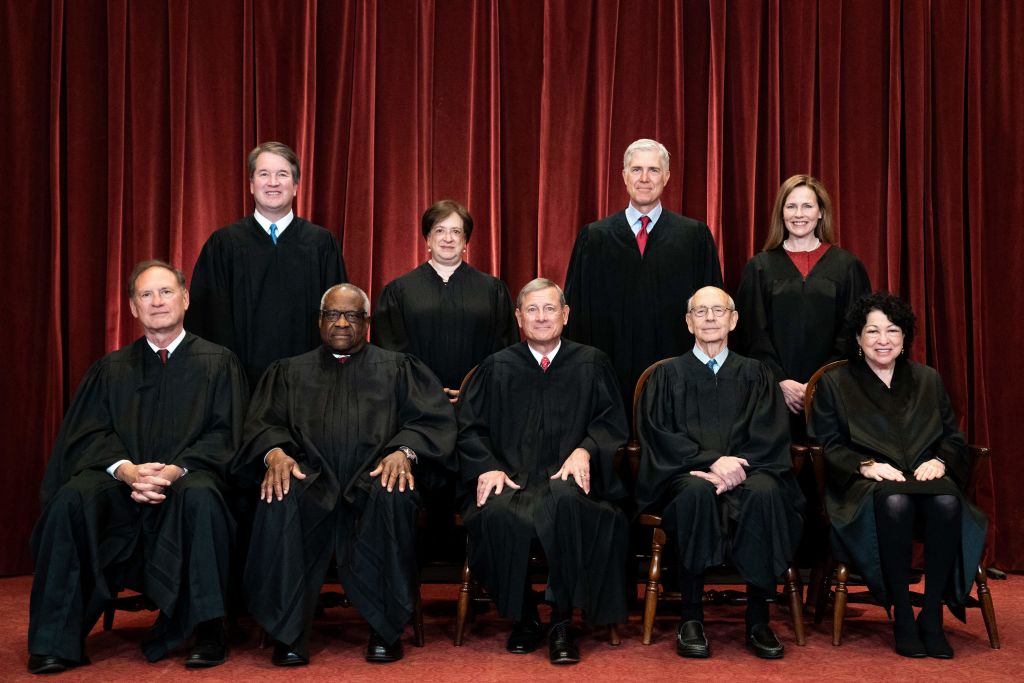In lauding Joe Biden’s promise to fill the upcoming vacancy on the Supreme Court with a black woman, last week the commentator Jonathan Capehart effused on PBS NewsHour that any black woman was bound to duplicate the retiring Justice Stephen Breyer’s famous pragmatism, because “there is no more pragmatic people in the world, of necessity, than a black woman [sic].” With no other knowledge of the prospective nominee beyond her race and sex, Capehart trotted out confidently that she will “probably be more impressive, have more qualifications, be more brilliant than the folks who have come in before her, because people used her race to downgrade and belittle and not think much of her simply because she was black.” With any black female pick, “we all know from jump that that person is more than qualified, is more than worthy, is more than able to sit on the bench.”
That’s because all black women are the same. Given that they’re all the same in good ways, this casual stereotyping is OK.
Let’s digress. When promoting my 2020 novel The Motion of the Body Through Space, I had a bracing encounter on a books show in the UK, which I’d blithely expected to be a cake walk. On meeting the hosts, I hastily recalibrated, for one of the women was large and tall with a shaven head. Her bearing was intimidating, her floor-length gown a shimmering purple. Oh, and did I forget to mention? She was black.
I’d ordinarily take all this in my stride — 5ft 2in and shrinking, I’m used to other people towering over me — except that one element of the new novel was a bit too likely to displease the purple one. Sure enough, the formidable presenter took immediate exception to a secondary character, who is not, she claimed, well-roundedly drawn.
Yet for a minor character, Lucinda Okonkwo is vividly drawn. The young second-generation Nigerian is aggressive, posturing and entitled. She’s also insecure, and for good reason. After earning a degree in gender studies, she’d worked only at a domestic violence charity before being hired to head Albany’s department of transportation.
Now, Lucinda makes for a bizarre beneficiary of American affirmative action. She’s more likely descended from slavers than slaves. Her educated parents are soaked in oil money. But because Lucinda has been coy about her sexuality and HR had ignorantly imagined that all Nigerians are Muslim, she’s been placed in a powerful post as a quadruple-token. With no experience in urban planning, this out-of-her-depth greenhorn proves catastrophic for the city’s transportation system. In short, this is a character whom few fiction writers would be daring enough — or stupid enough — to fashion: the incompetent diversity hire.
Why did I risk vilification? Because too many Americans in positions of authority have been put there for the wrong reasons.
With some deference, I suggested on the show that perhaps the host’s problem with Lucinda wasn’t that the character is two-dimensional but that she’s unattractive. Black women in fiction, film and television are always depicted as heroes and saviors, I noted, which didn’t grant black women the full spectrum of their humanity. Certainly, I said, Lucinda is a villain (though being given responsibilities she’s unprepared to handle is not really her fault). Why is it, I asked, that black women in modern-day narratives are never supposed to be villains?
My interrogator huffed that maybe that’s to make up for many years of doing the opposite, and the pendulum has simply swung the other direction. Not always a fast thinker on my feet, I let this go. But cycling home, I kicked myself. Black women have never been traditional villains. (Can you think of one? Even one?) They’ve been left out or sidelined; they’ve been depicted as foolish, as in Gone with the Wind but hardly ever portrayed as malign. Nowadays, they’re reliably wise (think the Oracle in The Matrix), tough, practical, savvy, brave, determined, unerringly competent and always right. In contemporary entertainment, all black women are the same.
So maybe we can’t blame Jonathan Capehart for glibly assuming that if we only appoint a black woman to the Supreme Court we all “know from jump” that she’s “more than qualified” to sit on the bench. I’d appoint that fierce, tenacious FBI agent on Ozark to the Supreme Court any day.
Capehart’s outdated conjectures aside, unless she is quite elderly, any black female jurist was educated during America’s half-century of affirmative action. She could credibly have been admitted to university and law school with lower test scores and grades than white or, latterly, Asian applicants. As the American professions have been obsessed with diversity since about 1970, rather than having battled the bitter headwinds of prejudice, she could have been if anything over-promoted during her career. But I can’t vouch for the particular qualifications of a nominee who’s not been named yet, because I for one don’t think all black women are the same.
Biden’s identitarian promise on this vacancy is obnoxious, just as his promise to choose a female vice-president was obnoxious. (And how did that work out? Never mind Lucinda; Kamala is the ultimate incompetent diversity hire.) How much more preferable had he announced “My selection will not be a strict constructionist,” or “He or she will be a moderate, a unifier.” But no. She will be black, which restricts the pool to around 2 percent of American lawyers. All other qualifications are secondary.
Biden has been gently criticized for putting race and sex quite so overtly up front, but it would have made no difference had he kept these stipulations to himself. Americans would still have assumed that any black female nominee was chosen for her race and sex. Which is atrocious. But this is the inevitable consequence of racial and gender preferences, which hurt most those they feign to help. No matter how experienced or gifted, stand-out minorities are indelibly tainted by the presumption that they owe their ascendancy to a leg up. To employ an expression I’m prone to avoid: that, my friends, is genuine “systemic racism.”
This article was originally published in The Spectator’s UK magazine. Subscribe to the World edition here.


















